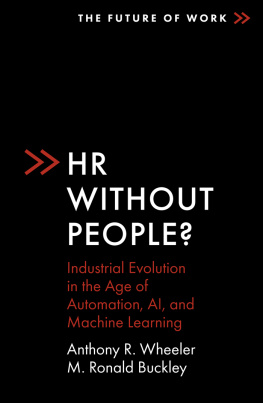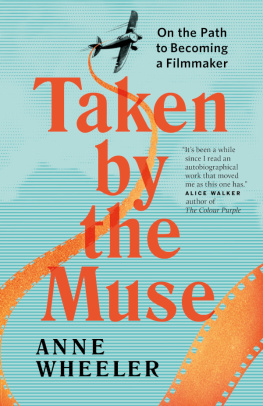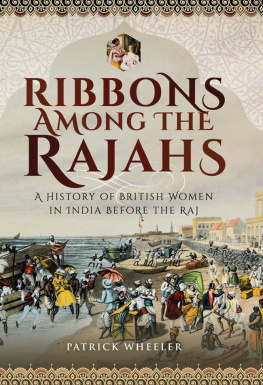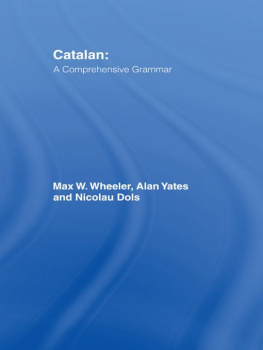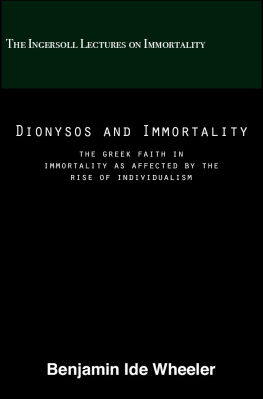Wheeler Anthony R. - HR Without People?
Here you can read online Wheeler Anthony R. - HR Without People? full text of the book (entire story) in english for free. Download pdf and epub, get meaning, cover and reviews about this ebook. year: 2019, publisher: Emerald Publishing Limited, genre: Business. Description of the work, (preface) as well as reviews are available. Best literature library LitArk.com created for fans of good reading and offers a wide selection of genres:
Romance novel
Science fiction
Adventure
Detective
Science
History
Home and family
Prose
Art
Politics
Computer
Non-fiction
Religion
Business
Children
Humor
Choose a favorite category and find really read worthwhile books. Enjoy immersion in the world of imagination, feel the emotions of the characters or learn something new for yourself, make an fascinating discovery.
- Book:HR Without People?
- Author:
- Publisher:Emerald Publishing Limited
- Genre:
- Year:2019
- Rating:3 / 5
- Favourites:Add to favourites
- Your mark:
- 60
- 1
- 2
- 3
- 4
- 5
HR Without People?: summary, description and annotation
We offer to read an annotation, description, summary or preface (depends on what the author of the book "HR Without People?" wrote himself). If you haven't found the necessary information about the book — write in the comments, we will try to find it.
HR Without People? — read online for free the complete book (whole text) full work
Below is the text of the book, divided by pages. System saving the place of the last page read, allows you to conveniently read the book "HR Without People?" online for free, without having to search again every time where you left off. Put a bookmark, and you can go to the page where you finished reading at any time.
Font size:
Interval:
Bookmark:
Take a moment to think about who you are as a person. After saying your name, how do you describe yourself to others upon first introduction? Do you begin your description with a set of nouns that convey a set of relationships are you a mother or father? Do you begin your description with a location where are you from? Do you begin your description with words about belonging to groups, teams, or organizations are you with these people; do you work for this company? Or do you often introduce yourself based upon what you do for work are you a human resources management professional? Obviously, situations dictate to a certain extent how you will initially describe yourself, but chances are that you will refer to your work or for whom and with who you work when describing who you are as a person. Whether you like your work or your employer very much or not, your work is fundamental to who you are as a person. Our work not only gives us a sense of self and expression but also provides us with opportunities opportunities to move, opportunities to provide, opportunities for fulfillment, opportunities of relationships and love, opportunities of freedom. Or work can, similarly, restrict all of those opportunities.
Some might argue that work provides nothing more than a means to an end. With work comes money or remuneration. With money comes the ability to purchase goods or services that sustain life, such as food, shelter, and safety. With money comes the ability to live a life of status or esteem. That is, some argue that the money earned through work can satisfy both our needs and wants. However, work one's own work can be dissociated from money. Consider that some people never work a day in their lives for need of money because they have wealth from previous generations. Yet even those who have inherited wealth often choose to work or assume a vocation derived from Latin to mean a calling to not just occupy their time but also to find some sort of meaning in their lives.
Moreover, money itself holds differential meaning for people and even societies.1 Before the advent of money, people engaged in barter an exchange between goods or services that required a time-consuming and sometimes messy process of establishing comparative worth between exchanged goods or services that rendered money largely irrelevant in most societies. Money, however, and the meaning ascribed to is still relative. In more individualistic societies, money increases the focus on personal goal attainment while money erodes communal behaviors in more collectivist societies. Simply stated, money disrupts cohesion and harmony between, with, and among people. People also vary in their attitudes toward money and the value they ascribe to money in terms of whether or not money is needed to live one's life the way one chooses to live that life. Inside of organizations, money is a known disruptor due to perceptions of equity or fairness in terms of how the organization distributes money in exchange for work. An employee can find perfect contentment in his or her salary, which satisfies both that person's wants and needs. Yet when that employee learns that a coworker earns more money for doing the same job or another job altogether that employee will suddenly feel dissatisfaction with the employer, become frustrated with how the employer treats employees, and likely begin looking for a new job in another company. The simple knowledge that a coworker earns more money can radically alter not only how one views his or her employer but also how one assesses how much money is now needed to cover his or her wants and needs. To further demonstrate the relativity of money, try the following experiment. In your mind, think about how much money you need to earn to happily live your life. Put an actual figure on that amount of money. Now ask your friends, family members, and coworkers that same question and ask if they will tell you their figures. What you will likely find is that your monetary figure will increase upon hearing what others' monetary needs to live a happy life are.
Not that people naturally talk about their earnings in social settings. Typically, the work one does will convey the social meaning of affluence or status. More to the point, though, is that people seldom describe themselves in terms of how much money they make. Money might provide the means to whatever ends a person wants or needs, but money does not provide the sense of self or belonging that one's job provides.
It is important to understand the pairing of sense of self and belonging mentioned above, as it helps to further explain why work becomes integral to one's sense of self. Humans by nature and evolution are primarily social animals, something obfuscated by pop and quite frankly, junk psychology that virally spreads through social media and the Internet. Even an introvert, someone whose natural predisposition is to prefer one-on-one or small group conversations as opposed to the extrovert's predisposition to prefer large group settings, is a social creature. Humans have a primary motivation to belong to groups that they feel are attractive and important. Belonging to a personally attractive group reflects favorably onto the individual. If a person belongs to an attractive group, it must mean that the individual is an important or good or attractive individual. This explains why companies with high brand identity receive not just more applicants for job openings but also significantly better applicants. Working for a highly recognizable company boosts the self-esteem of the employees who work for that company. It says something about who you are as a person to work for such a well-known and esteemed company.
Delving deeper into the psychological power of belonging to groups and how belonging to those groups alters your sense of self, consider what occurs to individuals when the groups they belong to come under attack or scrutiny. Let us assume you proudly work for a company that you feel is considered an industry leader. Your LinkedIn and other social media profiles display your work affiliation. You own company-branded apparel that you wear outside of work. Your company is a good company, and you are a good person. Unrelated to your actual job or even division, a public scandal hits your company. Word leaks and spreads quickly through the Internet and news media. Instead of reading or hearing about how great your company is, you now only hear negative things about your company. How do you feel about this? Do you proudly wear your company-branded apparel outside of work? Do you shy away from discussions about work with friends and family? You likely feel cognitive dissonance you are a good person but you work for a scandalous company. You will feel the need to alleviate this dissonance. Will you leave the company? Or will you double-down on your affiliation with the company? It is still a good company that employed people who did wrong, but that does not mean the entire company is bad. It does not mean you are bad.
This type of process plays out every day in almost every facet of one's life. This social identity process explains why groups of people have fought wars against each other for reasons that in hindsight appear trivial. Yet, when one's group is attacked even verbally it feels as though you as an individual are attacked. In defending your group's honor, status, or physical well-being, you are in fact defending your honor, status, and well-being. The levels of this social identity process can scale from a small unit of a group or team to a company to an industry or profession to a society. We see this social identity process play out in rivalries between sports teams, which can lead to physical violence among followers. We see this social identity process play out in labor relations settings. We see this social identity process play out in national politics, as political polarization continues to spread across the globe.
Font size:
Interval:
Bookmark:
Similar books «HR Without People?»
Look at similar books to HR Without People?. We have selected literature similar in name and meaning in the hope of providing readers with more options to find new, interesting, not yet read works.
Discussion, reviews of the book HR Without People? and just readers' own opinions. Leave your comments, write what you think about the work, its meaning or the main characters. Specify what exactly you liked and what you didn't like, and why you think so.

